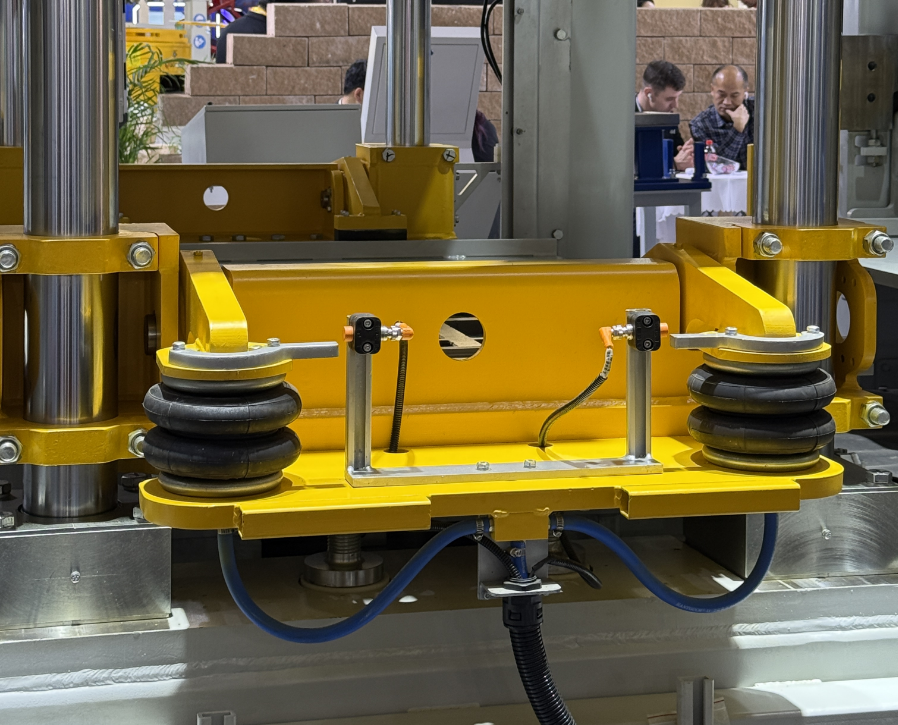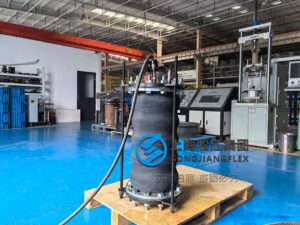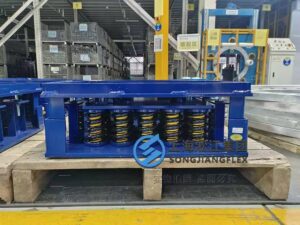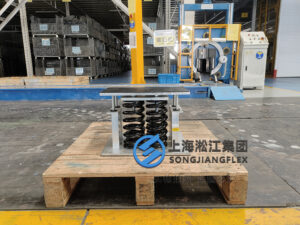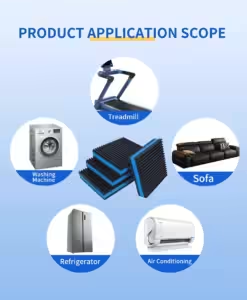What are Rubber Air Springs?
Rubber air springs, often used in , are pneumatic components designed to absorb vibrations and reduce shock. They consist of a flexible rubber bellows and an internal air chamber that can be inflated to adjust stiffness.
Rubber air springs are essential for reducing vibrations in brick-making machines, including brick compressors and other heavy equipment. By adjusting air pressure, they can provide optimal support and stability, improving machine longevity and performance.
In brick manufacturing equipment, such as , rubber air springs offer effective vibration isolation. Their ability to adjust air pressure ensures that they can handle various loads, making them adaptable to different brick making machines. This flexibility also helps reduce noise and prevent premature wear on equipment, leading to increased operational efficiency and longer machine life.
How Do Rubber Air Springs Work in Brick Making Machines?
In brick making machines, rubber air springs function by using compressed air to control the stiffness of the spring. This allows them to adapt to changes in load, reducing the effects of vibrations and shocks.
Rubber air springs work by adjusting air pressure, providing varying levels of support to brick making machines. This flexibility helps minimize vibration, ensuring smooth and efficient operations of equipment like brick compressors and other manufacturing machines.
Air pressure in rubber air springs can be customized to provide the necessary support for different types of brick making equipment. In a brick compressor, for example, the air spring can be inflated to absorb shock from the machine’s heavy load, reducing the impact on both the equipment and surrounding structures. The adaptability of these springs is crucial for maintaining a stable operating environment, reducing downtime, and preventing damage to costly equipment.
What Are the Benefits of Using Rubber Air Springs for Brick Making Machines?
Rubber air springs offer several benefits for brick making machines, including enhanced vibration isolation, reduced noise, and improved durability. These benefits translate into smoother operations and reduced maintenance costs.
Using rubber air springs in reduces vibrations, noise, and wear, leading to longer-lasting equipment and lower operational costs. Their ability to absorb shocks improves machine performance and stability, which is essential in brick manufacturing.
In brick manufacturing environments, where machines like operate under heavy loads, the ability to reduce vibration and noise can significantly impact the overall performance. By using rubber air springs, brick making equipment becomes more efficient, leading to smoother operations and fewer breakdowns. Additionally, the durability of the springs means fewer replacements are needed, reducing maintenance costs for the company.
Why Choose Rubber Air Springs Over Traditional Vibration Isolators?
Compared to traditional vibration isolators, rubber air springs offer more flexibility and superior performance in adapting to variable loads. They also provide longer-lasting solutions for equipment used in the brick-making industry.
Rubber air springs provide superior performance compared to traditional isolators. Their ability to adjust to different loads and their longer lifespan make them the ideal choice for brick making machines like and manufacturing equipment.
Traditional vibration isolators, such as rubber mounts or spring-based systems, can be less effective in environments where load changes are frequent. Rubber air springs, on the other hand, offer a unique advantage by adjusting air pressure to meet the specific needs of brick making equipment. This ability to customize support enhances both stability and performance in equipment like brick compressors, ensuring that operations run smoothly and efficiently.
What Is the Lifespan of Rubber Air Springs in Brick Making Machines?
Rubber air springs are designed for durability and can last for many years when properly maintained. Their lifespan is influenced by factors such as operating conditions, load frequency, and maintenance practices.
The lifespan of rubber air springs in brick making machines depends on usage and maintenance. When properly maintained, they can last for several years, providing consistent performance and reducing overall equipment downtime.
Rubber air springs in brick manufacturing equipment are built to withstand the tough conditions of high-load environments. Proper maintenance, including regular checks on air pressure and sealing, can significantly extend their lifespan. Brick-making machines, such as brick compressors, can benefit from the extended durability of rubber air springs, leading to fewer replacements and reduced operational costs.
What Are the Two Types of Air Springs?
There are two primary types of air springs: rubber air springs and metal air springs. Both have unique advantages depending on the application, but rubber air springs are more commonly used in brick making machines due to their flexibility and ease of installation.
Rubber air springs and metal air springs are the two main types. Rubber air springs are preferred in brick making equipment for their flexibility, adjustability, and superior vibration isolation capabilities.
While metal air springs offer high durability, they are often rigid and may not offer the same level of vibration isolation as rubber air springs. In brick making machines, where adaptability to different load conditions is crucial, rubber air springs are the better choice. Their flexibility makes them ideal for reducing vibrations in machines like and other manufacturing equipment, ensuring smoother and more stable operations.
How Do Air Bellows Work?
Air bellows are flexible components used in many industrial applications to absorb vibrations. In brick making machines, air bellows are often integrated with air springs to provide additional vibration isolation and shock absorption.
Air bellows work by expanding and contracting with air pressure changes, providing flexible support and absorbing shock. In brick making machines, they complement air springs by offering additional vibration control.
In the context of brick manufacturing, air bellows are often used in conjunction with rubber air springs to enhance vibration isolation. The bellow design allows them to compress and expand under varying air pressure, which helps absorb shock from the operation of heavy machinery like . This added flexibility is essential for preventing excessive wear on the equipment and surrounding structures.
What Is an Air Spring Actuator?
An air spring actuator is a device used to control the movement of air springs. It helps adjust the air pressure within the spring, allowing for precise control of vibration isolation in brick making machines.
Air spring actuators regulate the air pressure inside air springs, enabling precise control over the vibration isolation process. They are particularly useful in brick making machines to optimize performance.
In brick making machines, air spring actuators ensure that air springs provide the correct level of support and vibration control. By adjusting the air pressure within the spring, these actuators allow for precise control of the machine’s stability and performance. This is particularly important in high-load environments, such as those found in brick compressors and other heavy equipment used in brick manufacturing.
What Are the Materials Used in Air Springs?
Air springs are typically made from a combination of rubber, metal, and synthetic materials that provide flexibility, durability, and resistance to wear. The choice of materials affects the air spring’s performance in different applications.
Rubber, metal, and synthetic materials are commonly used to make air springs. The combination of these materials ensures that air springs are both flexible and durable, making them ideal for applications .
The materials used in air springs determine their strength and flexibility. Rubber is the primary material, providing the necessary flexibility to absorb vibrations. Metal reinforcements are often used to enhance the strength of the spring, while synthetic materials improve durability and resistance to environmental factors. This combination ensures that air springs perform well in the tough conditions found in brick making equipment, such as brick compressors and other machinery.
What Are the Disadvantages of Air Springs?
Despite their benefits, air springs do have some disadvantages. These include higher initial costs, the need for regular maintenance, and potential performance degradation over time.
Air springs, while effective, can be more expensive upfront and require regular maintenance. Over time, their performance may degrade if not properly maintained, leading to potential issues with vibration isolation.
The initial cost of air springs can be higher compared to traditional vibration isolators, which may be a concern for some brick manufacturers. Additionally, air springs require regular maintenance to ensure they continue to perform at their best. If air pressure is not properly regulated or if the springs are not sealed correctly, their effectiveness in vibration isolation can decrease, leading to potential issues with machine performance.
What Are the Raw Materials for Spring Making?
The raw materials used in spring making include steel wire, stainless steel, and other metal alloys. These materials are selected for their strength, elasticity, and ability to withstand stress.
Steel wire, stainless steel, and metal alloys are the primary materials used in spring making. These materials provide the necessary strength and durability for springs used in brick making machines.
The choice of raw materials in spring making is crucial for ensuring the durability and performance of the spring. Steel wire is commonly used for its strength and flexibility, while stainless steel is selected for its corrosion resistance. These materials are essential for making high-performance springs that can withstand the heavy loads and vibrations present in brick making equipment likeand manufacturing machinery.
Summary
Rubber air springs are an essential component for improving the performance and longevity of brick making machines, offering excellent vibration isolation, noise reduction, and durability.

